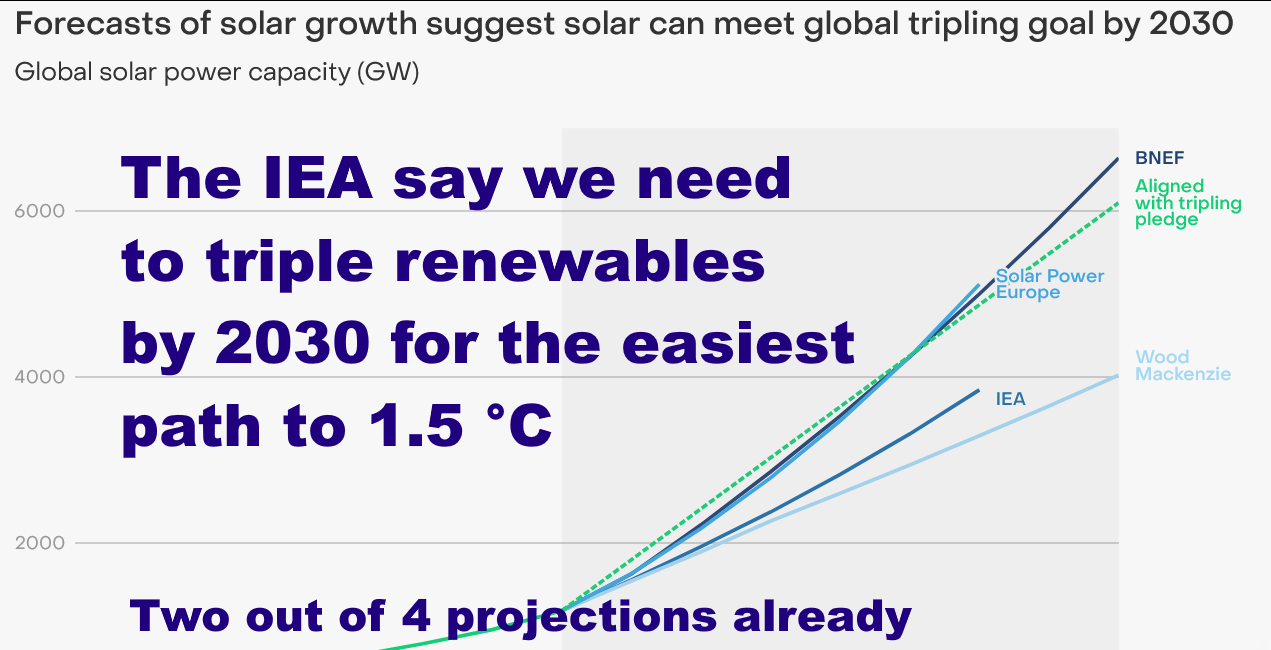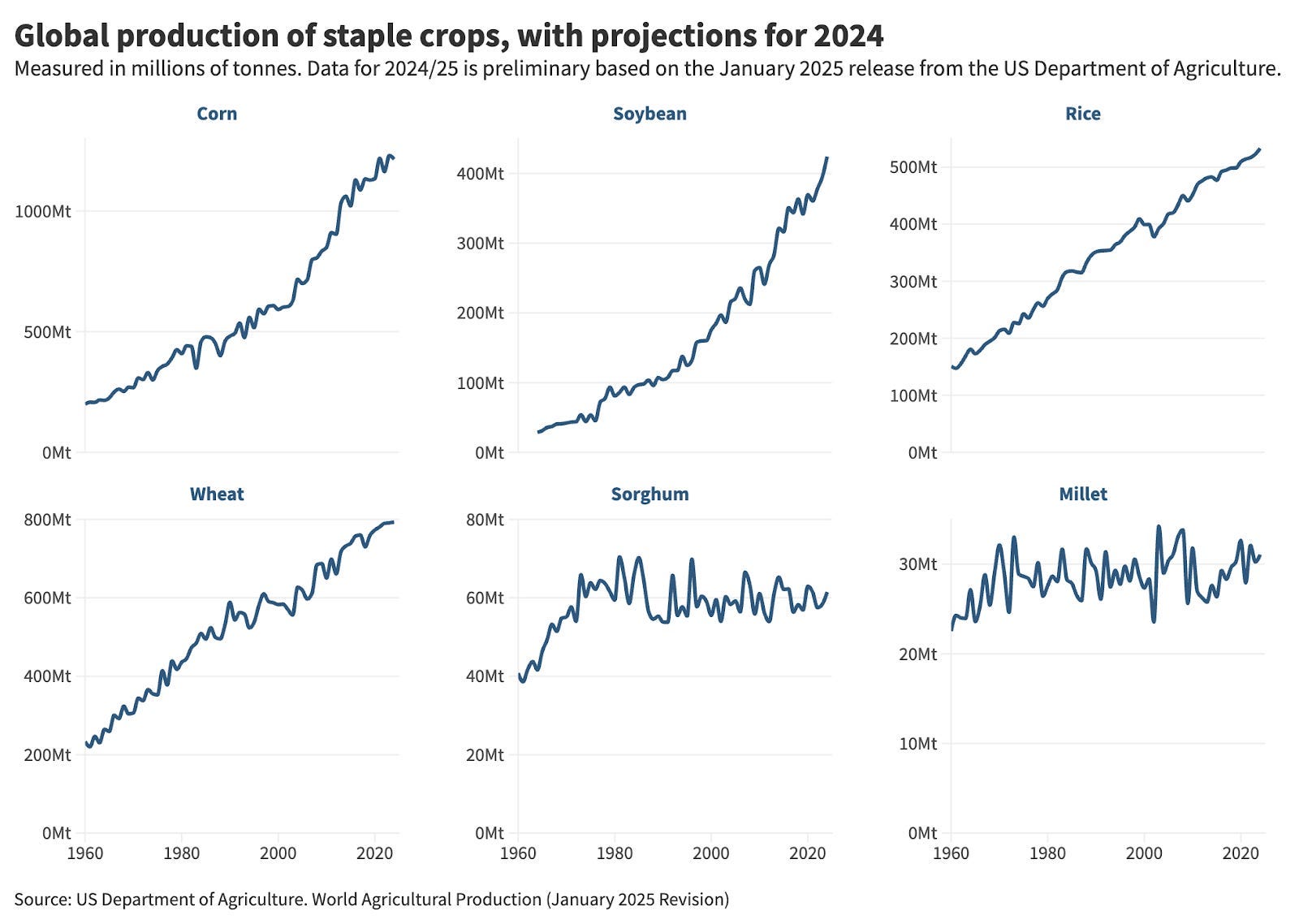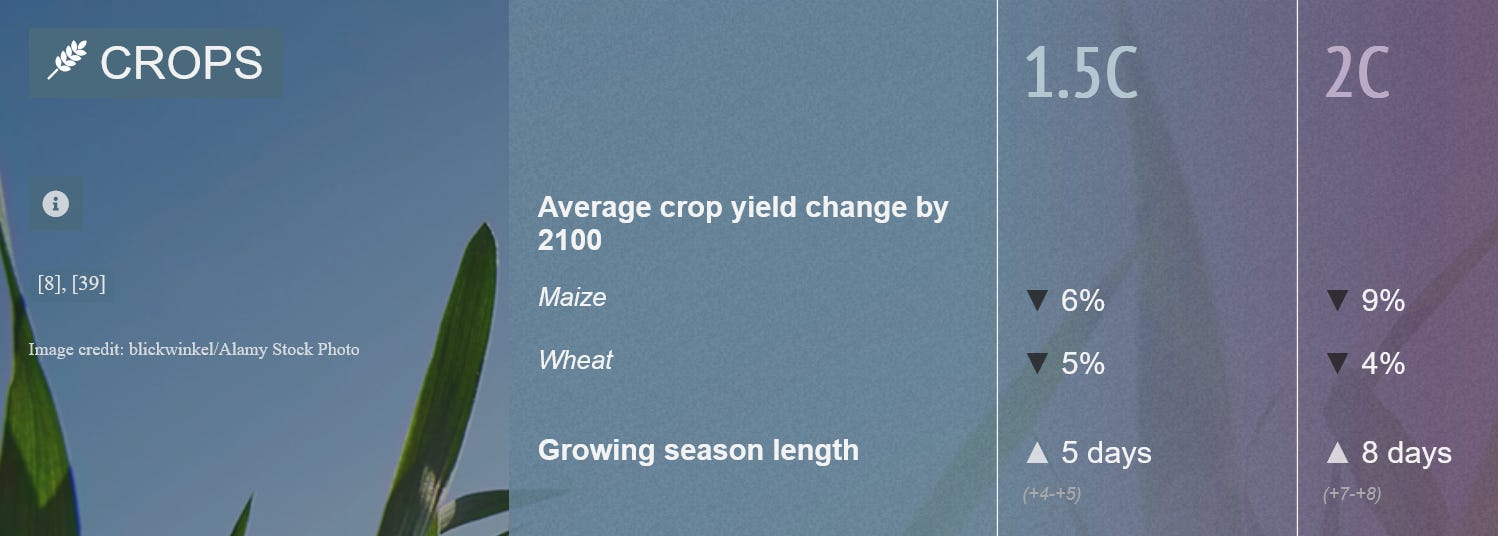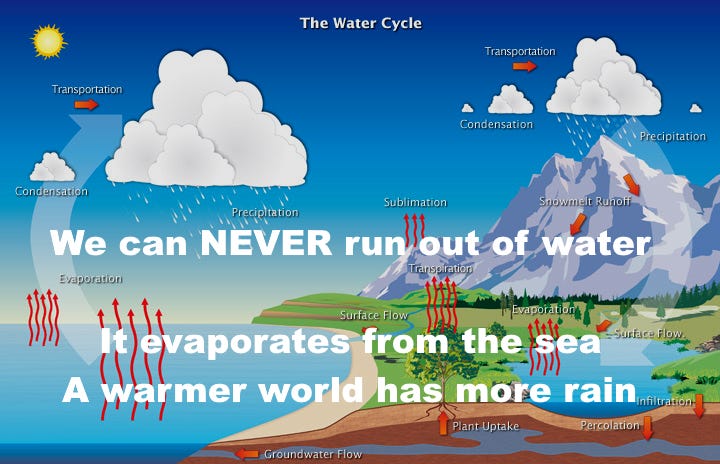World gets more habitable for humans as it warms on low emissions - almost all issues are to do with adapting fast enough - gets far easier as warming slows down then stops mid century
- MID EDIT will do some more work on this
As a simple example suppose you build your house just by a beach within 20 meters of the sea shore. Now the sea rises half a meter. The coastline on average will move back 75 meters. So now your house is in the sea.
But the problem isn't really the sea level rise. It's that you built your house in the wrong place for the future sea level that's all. It's not a worse world, it's just that it is expensive / difficult to adjust to it if you need to move your house or build a new house.
TEXT ON GRAPHIC:
Sea level rise isn’t the problem here.
The problem is the builders of this house didn’t know it would rise.
Our warmer world is better in many ways for both humans AND nature given time to adapt - it’s speed of warming needs care so long as we stay well below 3°C
We are increasingly following the sustainable development path with growth of everything we value
Plenty of food, water, shelter for eveyrone in the world on all emissions scenarios Weaker economies ar emost at risk because of expense of adaptation.
Background graphic: Last House on Holland Island, 2010.
Holland island is an island in Chesapeake Bay, in Maryland on the US East Coast which has seen higher sea level rises than most of the world - combined with the land also sinking slowly which made it worse. So this is one of the earliest effects of global warming.
See Holland Island
This house fell into the bay soon after this photo in October 2010 because of the damaged foundations.
Well that's a very simple one to see. But it's all like that. Especially on low emissions. People living in the wrong places for a warmer world or they have the wrong design of houses, or they have planted fruit trees that are the wrong variety and have to be dug up and replanted etc.
For nature too - about a tree that is growing in one place where it should be growing 100 km further north because it is now growing just a bit beyond the lower and of its range. Or it's become desert and the plants that used to live here need to move to another place that turned from desert to savannah.
It's not a worse climate in any objective way. Almost all the issues of fast global warming are because of adjusting to it.
This means it disproportionatley affects the weaker economies. The stronger economies can adjust. The main risk is things may cost a little more for a few decades. But for weaker economies similar problems can mean people dying. Because they can't afford to do the things that would help them to stay safe.
On food the world has plenty but the main risk is whether we are able to distribute it so that the weaker economies get enough get their fair share.
This is why in my blog posts I say that how we do it is far more important than the extra tenth of a degree saving in warming.
Now we are at the difference between 1.7 C and 1.5 C. But we can do both. Actually if we do stay within 1.5. C we can do it in a way that will also help the weaker economies as they need to transition rapidly to renewables and also it helps stops refugees, means they have enough food for themselves etc - all that helps the stronger economies too.
1.5°C still feasible with COP28 agreement to triple renewables by 2030 - NOT yet committed to 1.6°C or 1.7 C - though helping weaker economies and protecting nature is as important as -0.2°C reduction
This is to counteract gloomy claims that “1.5°C is dead”. First, this is all about a tenth of a degree. Everyone agrees we can still stay within 1.6°C but some are saying we can’t stay within 1.5°C.
Nothing much happens. Activists make it about human survival but it never was about that or about collapse of civilization. It was always about adjusting. For nature too, ecosystems can adapt but we are warming by 0.2 C per decade at present and that is just a bit too fast for nature to keep up with it easily if it continues for many decades.
So long as we stay well below 3 C, the end state is a net plus in many ways. At 3 C the only ecosystem we lose is the corals and they transition to sponges. Not just to desert. Even for corals its the speed is the issue, a warmer world is better for corals. It is better for biomass too. There is more nature, more rain, more food in a warmer world but the best places to grow things change and people need to adjust and migrate.
Crop yields are increasing every decade. 2023 was the hottest year on record, and crop yields were also at record highs.
BLOG: Yes 2023 is hottest year on record
— but just a short term +0.2 C on top of 1.2 C
— already adaptation is as important as reducing emissions
For most crops the yields are even higher in 2024 with an even warmer year than 2023.
Graphic from Hanna Ritchie’s How much food did the world produce in 2024?https://www.sustainabilitybynumbers.com/p/food-production-2024
The grains grown in wealthier countries are increasing year on year, corn, wheat, soyabean and rice. Huge dramatic increases in yields since the 1970s, doubling or tripling more than keeping up with population growth even with not much increase in crop area.
The only ones that are not increasingly rapidly are millet and sorghum. That's because those crops are grown almost entirely in Africa. Africa missed out on the Green Revolution and to this day it still hasn't had it. The Green Revolution was a big increase in productivity of crops by developing new varieties, getting traits from wild varieties and breeding them - and working out new ways of growing them. But nobody has bothered to do that with millet or sorghum. Also they are grown inefficiently in smallholdings that can't afford the best ways of growing them. They may increase in yield nearly 10-fold when Africa finally has the proper green revolution.
Graphic from Hanna Ritchie’s How much food did the world produce in 2024?https://www.sustainabilitybynumbers.com/p/food-production-2024
If you look at prediction from 2018 for the difference between 1.5 and 2 C then maize should be down 6% by 1.5 C and wheat by 5%.
The impacts of climate change at 1.5C, 2C and beyond - scroll down to the grain icon.
But they didn't take proper account of the CO2 fertilization effect. Wheat increases at 1.5 C and at 2 C for the same variety.
How will climate change affect crop yields in the future?
But most of that increase is because of improvements in the crops themselves.
We can continue to grow enough food for everyone on all scenarios.
BLOG: We can grow enough food for everyone through to 2100 and beyond on all scenarios
We also have plenty of water in a warmer world. Yes many areas get drier but a warmer world has more rainfall overall than a cooler world. So the problems are localized not global.
We can NEVER run out of water.
It evaporates from the sea
A warmer world has more rain.Background image from: The Water Cycle
And nowhere gets too hot for humans.
The risk is migration from areas too hot for humans but that only starts to be a risk over significant areas of the hottest parts of the world during their worst heat waves at around 4 C of warming, which is now impossible. It is important to drink enough water in heat waves already. Also get plenty of ventilation. But so long as you do that you are fine. At any future warming level.
And at the now impossible 4 C of warming in the hottest places in the hottest heat waves, they don't die they just get a temperature like a fever if the air conditioning stops working.
See my:
We are headed for well below 3 C and that means we save the corals, the only ecosystem that is at risk in its entirety - and that's only at high levels of warming if the oceans aren't alkaline enough for corals.
As for humans, all that would happen at 4 C is that some farmers in the hottest parts of China wouldn't be able to work in their paddy fields during heat waves and would need air conditioning to stay cool and many cities would need air conditioning to stay cool in the hottest heat waves.
Actually even without air conditioning they'd just have a slight temperature. People wouldn't die at 4 C. It would be like having a slight fever without being ill. And that's only if the air conditioning fails. Most people in such conditions will have air conditioning and won't notice.
That already happens in tiny hot spots but the people there never noticed until scientists collated the data later. Probably because they all use air conditioning anyway.
Scientist later figured out that some small cities briefly went over the limit of 35C wet bulb above which you can't keep cool to normal blood temperature by sweating. This has been happening for decades but nobody noticed before.
It only happens to larger areas of the world at around 4 C.
As for the whole world it can't happen even if we burn all the fossil fuels quickly we can't make it happen.
There aren't any temperature tipping points, by IPCC AR6 / WG1 Chapter 7.
Earth can’t warm suddenly - no temperature tipping point - radiates so much extra heat with each extra 1°C of warming - it can't trap or absorb it all - even with all possible feedbacks at their max
This is about temperature tipping point , the mistaken idea that a small temperature increase can lead to a large one of several degrees. The IPCC looked at this in 2021 AR6 / WG1 and showed it can’t happen, virtually certain. This has been much misunderstood by the popular press and infographic YouTube channels.
Humans are desert adapted animals.
There is NO longer ANY realistic warming scenario where significant parts of the world become too hot to live in
The issue is the speed of change not the end state. Especially on low emissions, well below the 3 C when we lose corals, a warmer world is a benefit long term for many ecosystems including warm water corals - able to live in seas that used to be too cold for them - which is also why once we significantly reduce emissions every year that's already a benefit as it means there is more time to adjust.
BLOG: The warming of the Anthropocene has benefited the world in many ways
Even all the things about fires, drought, flooding, hurricanes etc are not about the whole world it's about these things happening in places where people have built houses / organized their lives around no flooding, not drought, gentler winds etc and the change is what's the problem not the end state - there re others in other places that have always had conditions like that and they are already adapted. Or have moved, don't live in the places where it is very very dry or where their houses would be underwater etc.
As a simple example suppose you build your house just by a beach within 20 meters of the sea shore. Now the sea rises half a meter. The coastline on average will move back 75 meters. So now your house is in the sea.
But the problem isn't really the sea level rise. It's that you built your house in the wrong place for the future sea level that's all. It's not a worse world, it's just that it is expensive / difficult to adjust to it if you need to move your house or build a new house.
Well that's a very simple one to see. But it's all like that. Especially on low emissions. People living in the wrong places for a warmer world or they have the wrong design of houses, or they have planted fruit trees that are the wrong variety and have to be dug up and replanted etc.
For nature too - about a tree that is growing in one place where it should be growing 100 km further north because it is now growing just a bit beyond the lower and of its range. Or it's become desert and the plants that used to live here need to move to another place that turned from desert to savannah.
It's not a worse climate in any objective way. Almost all the issues of fast global warming are because of adjusting to it.
This means it disproportionatley affects the weaker economies. The stronger economies can adjust. The main risk is things may cost a little more for a few decades. But for weaker economies similar problems can mean people dying. Because they can't afford to do the things that would help them to stay safe.
On food the world has plenty but the main risk is whether we are able to distribute it so that the weaker economies get enough get their fair share.
This is why in my blog posts I say that how we do it is far more important than the extra tenth of a degree saving in warming.
Now we are at the difference between 1.7 C and 1.5 C. But we can do both. Actually if we do stay within 1.5. C we can do it in a way that will also help the weaker economies as they need to transition rapidly to renewables and also it helps stops refugees, means they have enough food for themselves etc - all that helps the strongre economies too.
1.5°C still feasible with COP28 agreement to triple renewables by 2030 - NOT yet committed to 1.6°C or 1.7 C - though helping weaker economies and protecting nature is as important as -0.2°C reduction
This is to counteract gloomy claims that “1.5°C is dead”. First, this is all about a tenth of a degree. Everyone agrees we can still stay within 1.6°C but some are saying we can’t stay within 1.5°C.
And my old blog post here covers the essentials.
CONTACT ME VIA PM OR ON FACEBOOK OR EMAIL
If you need to talk to me about something it is often far better to do so via private / direct messaging because Quora often fails to notify me of comment replies.
You can Direct Message my profile (then More >> messages). Or better, email me at support@robertinventor.com
Or best of all Direct Message me on Facebook if you are okay joining Facebook. My Facebook profile is here:. Robert Walker I usually get Facebook messages much faster than on the other platforms as I spend most of my day there.
FOR MORE HELP
To find a debunk see: List of articles in my Debunking Doomsday blog to date See also my Short debunks
Scared and want a story debunked? Post to our Facebook group. Please look over the group rules before posting or commenting as they help the group to run smoothly
Facebook group Doomsday Debunked
Also do join our facebook group if you can help with fact checking or to help scared people who are panicking.
SEARCH LIST OF DEBUNKS
You can search by title and there’s also an option to search the content of the blog using a google search.
CLICK HERE TO SEARCH: List of articles in my Debunking Doomsday blog to date
NEW SHORT DEBUNKS
I do many more fact checks and debunks on our facebook group than I could ever write up as blog posts. They are shorter and less polished but there is a good chance you may find a short debunk for some recent concern.
See Latest short debunks for new short debunks
I also do tweets about them. I also tweet the debunks and short debunks to my Blue Sky page here:
Then on the Doomsday Debunked wiki, see my Short Debunks page which is a single page of all the earlier short debunks in one page.
I do the short debunks more often but they are less polished - they are copies of my longer replies to scared people in the Facebook group.rough Ukraine and will do so no matter what its allies do to support Ukraine.











